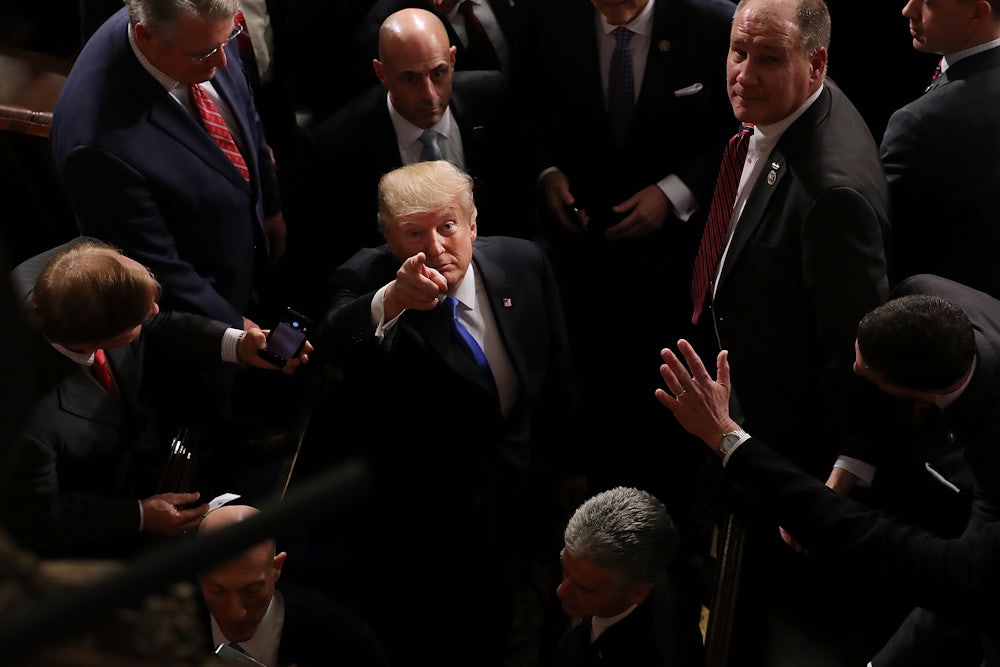President Donald Trump’s State of the Union address on Tuesday drew mixed reviews from the pundits, but even some who considered it a success used the occasion to argue that the president is a flawed communicator. The speech, these observers said, showed what kind of president Trump could be if he were disciplined and focused on persuading Americans, rather than ranting on Twitter. In other words, Teleprompter Trump can be truly presidential, but is consistently undermined by Twitter Trump.
“The speech offered a window into what might have been, if he had stuck to script and shown more self-discipline during his first year,” argued The Washington Post’s James Hohmann. “Trump’s approval rating could easily be 10 points higher right now if he just behaved the way he did last night, even while pursuing an identical agenda. The speech worried politically savvy Democrats because it suggested that he has upside potential.” John F. Harris and Matthew Nussbaum of Politico agreed, writing that the speech showed what would happen if “Trump somehow brought to heel the impulsiveness and improvisation that define his politics.” If that miracle happened, he “would be in a commanding position in American politics after one year in power, with his own party firmly locked down and Democrats on the defensive.”
Writing in The Atlantic, David Frum took a cooler view of the speech, but shared the view of held by Hohmann, Harris, and Nussbaum that communications is a key part of being a successful president—and that Trump is very bad at it. “President Trump uses words often and uses them spectacularly: to mobilize his core followership, to bully and belittle opponents, to tweet his hurts and grievances,” Frum wrote. “What he does not do is argue a case to change minds and gain consent.” Frum cited political scientist Richard Neustadt, who wrote in 1960s, “Presidential power is the power to persuade.”
This is surely true of conventional presidents, such as Ronald Reagan, Bill Clinton and Barack Obama. These men all deployed eloquent words to shape political discourse. This is the standard by which Trump is being accused of being a poor communicator. But Trump is no ordinary president, and his singular achievement has been to redefine the presidency in his own terms. He’s also brought the Republican Party along with him. If we look at Trump by his own goals, he is in fact a singularly successful communicator.
Just consider his story: A political novice, he won the Republican nomination despite the complete opposition of the leadership elite of own party. Then, even as he ran a singularly chaotic campaign, he won the presidency, defeating the nominee of the party that had overseen an economic recovery from the worst financial crisis since the Great Depression. But more than that, he’s remade the Republican Party in his own image, so that politicians who initially distrusted him, like House Speaker Paul Ryan and Senate Majority Leader Mitch McConnell, now carry his water. As the recent controversy over the memo prepared by House Intelligence Committee Chair Devin Nunes shows, the GOP is willing to go to extraordinary lengths to protect Trump.
Unlike Reagan, Clinton, or Obama, Trump is not interested in issues like the proper size of government; unlike earlier Republican presidents, he didn’t mention “debt” during his State of the Union. Rather, Trump’s main concern is being the victor and the king of American life. By winning the loyalty of the Republican base through divisive cultural and racial rhetoric, he’s achieved that goal.
Will Wilkinson, vice president of policy at the Niskanen Center, challenged the idea that Trump is a poor communicator.
I think Trump *gets* the extent and strategic implications of voter ignorance way better than the typical politician.
— Will Wilkinson 🌐 (@willwilkinson) January 30, 2018
The stupider and falser Trump claims are, the more coverage they get, and increasing the likelihood that low-engagement folks will hear his stupid and false claim, which many will simply accept without ever hear a word to the contrary.
— Will Wilkinson 🌐 (@willwilkinson) January 30, 2018
Trump succeeds in speaking to “low-engagement folks” because he’s a low-information voter himself. He doesn’t have strong policy or ideological preferences, but powerful tribal feelings that are stoked by Fox News. Trump instinctively understands how to pitch arguments based either on racial paranoia (such as the lurid stories of immigrant crime he recounted during the State of the Union) or partisan paranoia (such as the deep-state conspiracies that cloud news about White House wrongdoing or the Russia investigation).
In his own way, Trump as great a communicator as Reagan, precisely because he rarely tries to persuade Democrats or win over reporters from the Post or Politico. Rather, he is keenly focused, whether by instinct or design, on talking to ordinary Republicans. Trump knows that his political fate is tied to those voters. As long has he has them on his side, the Republican political class will protect him from the scandals that threaten his presidency. He is the master communicator of the age of partisan polarization, which he has done so much to create.
